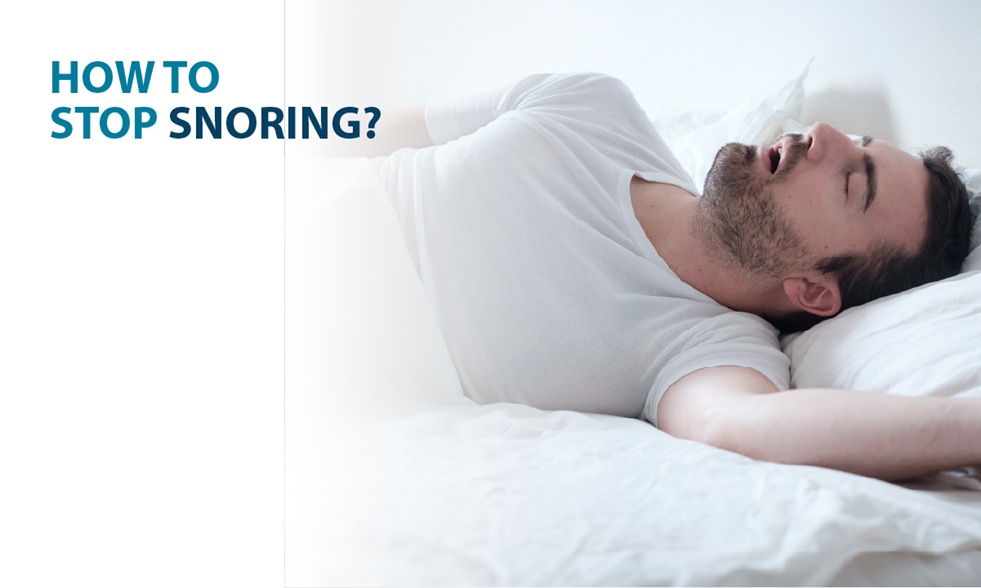How to Stop Snoring?
February 13, 2025
Snoring is an ordinary phenomenon experienced by millions of individuals worldwide. Though often downplayed as part of night time annoyances, snoring may actually indicate something severe in terms of serious health conditions underneath. The good news is that snoring can be managed and stopped with the right approach. From simple lifestyle changes to medical and surgical intervention, it is possible to enjoy a restful, peaceful night's sleep.
In this blog, we are going to explore various methods on how to stop the snoring effectively.
What Causes Snoring?
Snoring takes place when the air stream is partially blocked during sleep flow turbulence, causing the tissues in the throat to vibrate. There can be various reasons for the above:
- Relaxed throat muscles
- Obese or extra weight on neck
- Nasal congestions or sinus infections
- Sleeping position mostly backs down.
- Drinking alcohol before bedtime
- Structural problems like a deviated septum or enlarged tonsils
Snoring from time to time is not greatly into concern; however, when repeated, it can be an indication of Obstructive Sleep Apnea (OSA), which ought to be medically treated.
Stopping Snoring: Effective Solutions
Stopping a person from snoring may be done through several ways, from the simplest of ways to complicated procedures in medicine. If you need to know how to stop snoring, let us see the most efficient techniques.
1. Lifestyle Changes and Home Remedies
For mild snorers, some changes in daily habits could work wonders. Here is what you can do:
a) Losing Weight and Exercising
Excess fat around the neck pushes down on the airway and worsens snoring. Thus, a healthy diet with regular exercise will help improve fatty tissue in the neck and be one of the best methods about how to stop snoring naturally.
b) Strengthen the Muscles within your Throat
Practice some throat muscle strengthening exercises that can be used to stop people from snoring and, in fact, reduce the frequency of occurrence. Examples of such exercises include:
- Chew Gum as an Exercise to Exercise the Jaw and Throat Muscles:
- Practice Breath Control to Control that of Pranayama:
- Sing or Play Wind Instruments to Enhance Muscle Control
c) Adjust Your Sleeping Position
This can really change a lot:
- Prefer sleep on sides and not back to avoid blockages of airway.
- Put your head up with a good pillow so that airflow will be improved.
- Some find they can reduce their snoring by sleeping in a slightly prone position, that is, on their stomach.
d) Make an Ideal Sleep Environment
Then a well-designed sleep environment would improve sleeping quality and reduce snoring:
- Keep bedroom cool and devoid of allergens.
- Use a humidifier when the air is too dry.
- Relaxing bedtime routine like soft music or meditation can be tried.
2. Medical Devices and Treatments
If home remedies fail, it may be time to consider medical solutions. What are the ways to stop snoring right away? Try these options:
a) CPAP, BiPAP, and AutoPAP Machines
Using these machines is popular for treating moderately to severely snoring patients suffering from sleep apnea. They provide continuous airflow to keep the airway open.
- CPAP: Continuous positive airway pressure (delivers a continual supply of air to avoid collapse of the airway).
- BiPAP: Bilevel positive airway pressure (provides different air pressures for inhalation and exhalation).
- AutoPAP: Automatic positive airway pressure (the adjusting airflow based on breathing patterns).
Always use these devices under medical supervision to avoid treating conditions' symptoms instead of their underlying causes.
3. Surgical Treatments in Extreme Cases
Surgery may be recommended for a few cases of severe snorers or those with Obstructive Sleep Apnea not responding to other remedies. Some examples of the types of surgery are:
a) Nasal Surgeries
- Septoplasty: This corrects a deviated septum, providing better air flow through the nasal cavity.
- Turbinate Reduction: A procedure to shrink enlarged nasal turbinates, allowing nasal air passages to be cleared.
b) Throat and Palate Procedures
- Uvulopalatopharyngoplasty (UPPP): Removes excess tissue of the throat to widen the airway.
- Tonsillectomy and Adenoidectomy: Remove enlarged tonsils or adenoids, which could be obstructing the airway.
- Palatal Implants: Stiffen soft palate to reduce vibration and snoring.
Such procedures are undertaken by experienced ENT specialists and can be tailored to the specific needs of each patient.
When to See a Doctor?
When snoring interrupts, the normal pattern of sleep or the quality of health, then you need to see a doctor. Here are warning signs:
- Loud, disruptive snoring affecting the quality of sleep
- Stopped breathing during sleep appears in episodes
- Feeling excessively sleepy and difficulty in concentration during the day
- Morning headaches or a dry mouth every morning
- Hypertension or other cardiovascular ailments
The diagnosis needs to be done to treat chronic snoring as serious complications may occur if not treated.
Conclusion:
Snoring is not just a minor nuisance. More importantly, snoring could signal more serious health issues underlying the apparent noise. Thankfully, there really is much to do about it: from basic lifestyle adjustments in how one sleeps to medical devices and surgical intervention. If snoring affects your quality of sleep or your partner's, unquestionably do not wait: today is the day for a solution that best works for you! How to stop snoring? The answer depends on your specific condition, but good night sleep is possible with the right approach!
NOTICE BOARD
CONTACT US
CONTACT US
 Book Appointment
Book Appointment


.svg)
.svg)
.svg)
.svg)








